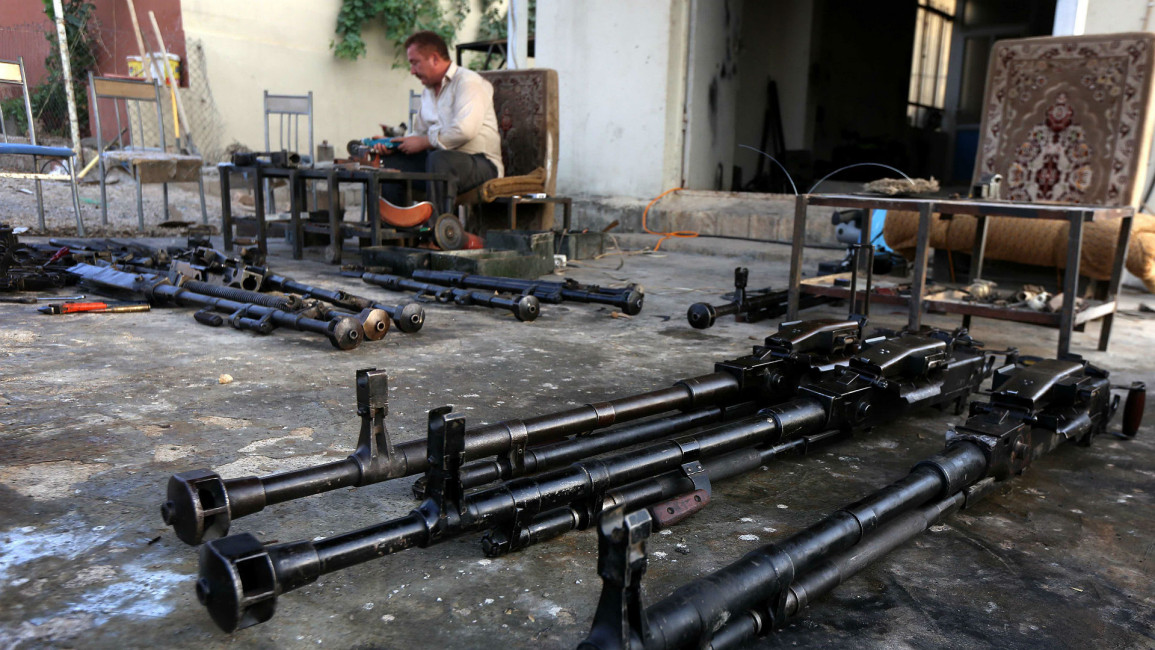Kurdish government shuts down arms market in Iraq's Erbil
Kurdish government shuts down arms market in Iraq's Erbil
The Kurdistan regional government in Iraq has closed down a major arms market in Erbil following reports of irregular trading in weapons supplied to the Peshmerga by Germany.
2 min read
Iraq's government wary of expanding Peshmerga’s influence [Getty]
Security forces in Erbil have closed down an arms market in the city in an attempt to prevent irregular trading in arms that have been received from Germany in order to fight the Islamic State.
Member of the Iraqi-Kurdistan parliament's interior affairs committee, Nazem al-Harki, told The New Arab that the law prohibits buying and selling all types of weapons, but that weapons are being traded in certain parts of Erbil and other cities, adding that these informal markets will be shut down.
He added that the existence of such places and trade is problematic and has led to "social problems".
In 2014, the German government started to send weapons to the Kurdish Peshmerga in northern Iraq, to support them in the fight against the Islamic State after the militant group attacked Erbil.
As part of the weapons package, Germany provided the Peshmerga 4,000 more G-36 assault rifles, six million rounds of ammunition and 200 Milan anti-tank missiles. At least five armored personnel carriers are also part of the package, according to Kurdish news outlet Rudaw.
"The Peshmerga perfectly know how to handle weapons they get from Germany," German Defense Minister Ursula von der Leyen said at the time.
"They have shown themselves as a successful and effective ground force against the barbaric ISIS."
Yet recent German media reports say that guns provided by Germany to Peshmerga forces are traded and sold on the arms market in Kurdistan.
According to The Daily Sabah, delayed salaries to Peshmerga fighters led to them selling their weapons.
The Ministry of Peshmerga has responding to these reports, saying that individual cases may have occurred it is not as common as portrayed by the German media.
Germany is one of the few countries who have been directly arming the Peshmerga as opposed to arms being transferred to the force through the Iraqi government in Baghdad.
Last week the Kurdistan government said that they would arm minority groups in contested areas of Iraq to fight against IS.
However the Iraqi government criticized the plans as an attempt to expand Peshmerga’s influence in disputed areas.
Member of the Iraqi-Kurdistan parliament's interior affairs committee, Nazem al-Harki, told The New Arab that the law prohibits buying and selling all types of weapons, but that weapons are being traded in certain parts of Erbil and other cities, adding that these informal markets will be shut down.
He added that the existence of such places and trade is problematic and has led to "social problems".
In 2014, the German government started to send weapons to the Kurdish Peshmerga in northern Iraq, to support them in the fight against the Islamic State after the militant group attacked Erbil.
As part of the weapons package, Germany provided the Peshmerga 4,000 more G-36 assault rifles, six million rounds of ammunition and 200 Milan anti-tank missiles. At least five armored personnel carriers are also part of the package, according to Kurdish news outlet Rudaw.
"The Peshmerga perfectly know how to handle weapons they get from Germany," German Defense Minister Ursula von der Leyen said at the time.
"They have shown themselves as a successful and effective ground force against the barbaric ISIS."
Yet recent German media reports say that guns provided by Germany to Peshmerga forces are traded and sold on the arms market in Kurdistan.
According to The Daily Sabah, delayed salaries to Peshmerga fighters led to them selling their weapons.
The Ministry of Peshmerga has responding to these reports, saying that individual cases may have occurred it is not as common as portrayed by the German media.
Germany is one of the few countries who have been directly arming the Peshmerga as opposed to arms being transferred to the force through the Iraqi government in Baghdad.
Last week the Kurdistan government said that they would arm minority groups in contested areas of Iraq to fight against IS.
However the Iraqi government criticized the plans as an attempt to expand Peshmerga’s influence in disputed areas.


![President Pezeshkian has denounced Israel's attacks on Lebanon [Getty]](/sites/default/files/styles/image_684x385/public/2173482924.jpeg?h=a5f2f23a&itok=q3evVtko)



 Follow the Middle East's top stories in English at The New Arab on Google News
Follow the Middle East's top stories in English at The New Arab on Google News


